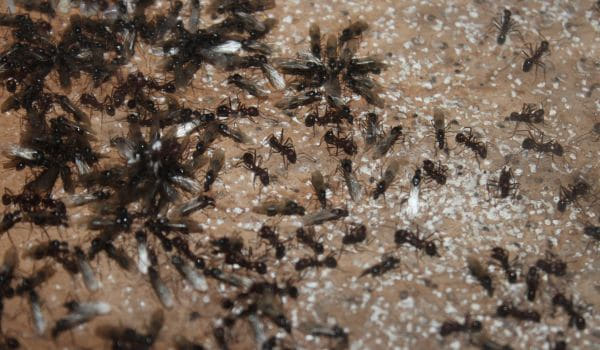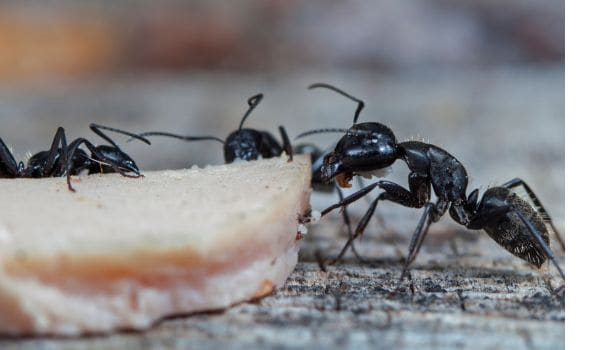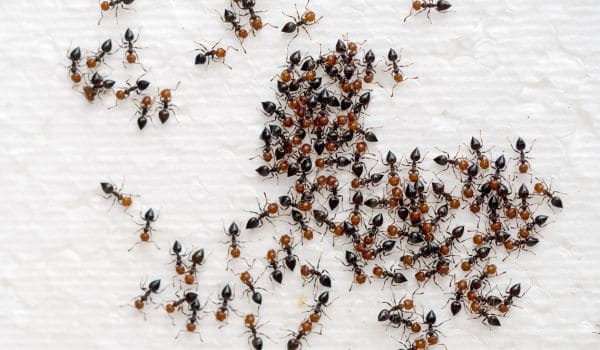In households, the presence of big black ants in the kitchen can quickly become a nuisance and a cause for concern. These insects are not only unsightly but can also pose a threat to food hygiene and safety. Addressing this issue promptly is crucial for several reasons. Firstly, big black ants are known to contaminate food surfaces and can carry harmful bacteria, putting the health of occupants at risk. Additionally, neglecting the problem may lead to an infestation, making it more challenging and costly to eradicate in the long run. Furthermore, the mere sight of ants in the kitchen can be unsettling and may compromise the overall comfort and cleanliness of the living space. Therefore, taking immediate action is not just about eliminating an inconvenience; it is a proactive step toward maintaining a healthy and hygienic home environment.
Identification of Big Black Ants

Big black ants, often referred to as carpenter ants or black garden ants, possess distinctive characteristics and behaviors that set them apart in the insect world. These ants are notably larger than their counterparts, with a dark, black coloration that aids in their identification. Understanding their behavior is crucial for effective control measures. Big black ants are known for forming well-defined trails, guided by pheromones, as they search for food sources. These trails may lead them into kitchens and pantries, making it imperative to observe and comprehend their movements for successful eradication.
Identifying potential entry points is the next step in managing a big black ant infestation. These insects can infiltrate homes through various openings, including cracks in walls, gaps around windows and doors, and utility penetrations. By recognizing and addressing these entry points, homeowners can implement targeted prevention strategies to stop the ants from accessing the kitchen.
Prevention Measures

Cleaning and Sanitation
Proper cleaning and sanitation practices are fundamental in deterring big black ants from invading the kitchen.
Properly Store Food Items
Storing food in airtight containers prevents the scent of enticing edibles from attracting ants. This step is particularly crucial for dry goods susceptible to ant infestation.
Regularly Clean Countertops and Floors
Consistent cleaning routines, involving the removal of crumbs and spills, eliminate potential food sources. This denies ants the sustenance they seek, discouraging their presence in the kitchen.
Seal Food Containers Tightly
Ensuring that food containers are securely sealed prevents ants from gaining access to stored food. This measure not only protects the food but also disrupts the ants’ foraging patterns.
Eliminating Water Sources
Addressing moisture-related issues is vital in making the kitchen less hospitable for ants.
Fixing Leaky Faucets
Timely repair of leaky faucets and pipes removes standing water that may attract ants. Eliminating this water source contributes significantly to ant prevention.
Drying Wet Areas in the Kitchen
Wiping and drying wet surfaces promptly denies ants access to water. This proactive step minimizes the chances of infestation and complements other preventive measures.
Sealing Entry Points
Preventing ants from entering the home is a key aspect of long-term control.
Inspecting and Sealing Cracks in Walls
A thorough inspection of walls allows homeowners to identify and seal visible cracks using appropriate sealants, closing off potential ant entry points.
Closing Gaps Around Windows and Doors
Installation of weather stripping or using caulking to seal gaps around windows and doors is an effective way to fortify the home against ant intrusion. By combining these preventive measures, homeowners can create an environment that is less attractive to big black ants, reducing the likelihood of infestation and promoting a pest-free kitchen.
Natural Remedies

Natural remedies offer an eco-friendly and chemical-free approach to repelling big black ants in the kitchen. These methods leverage common household items to create deterrents that are safe for both residents and the environment.
Vinegar Solution
Mixing Equal Parts Water and White Vinegar
Combining equal parts water and white vinegar creates a potent solution with acetic acid, a substance disliked by ants. This mixture serves as an effective cleaning agent and ant deterrent.
Wiping Down Surfaces with the Solution
Applying the vinegar solution to kitchen surfaces, particularly countertops and areas prone to ant activity, helps eliminate scent trails and disrupts the ants’ communication. Regular use maintains a hostile environment for the insects.
Lemon Juice
Spraying Lemon Juice in Ant-Prone Areas
The high acidity of lemon juice acts as a natural ant-repellent. Spraying lemon juice along ant trails, entry points, and other vulnerable areas creates a barrier that discourages ants from crossing.
Using Lemon Peels as a Deterrent
Placing lemon peels strategically near entry points or areas with high ant activity capitalizes on the natural oils found in citrus peels. These oils contain compounds that ants find displeasing, serving as a natural deterrent.
Borax and Sugar Mixture
Creating a Bait Using Borax, Sugar, and Water
Borax, when mixed with sugar and water, creates an effective ant bait. While the sugar attracts the ants, the borax acts as a slow-acting poison. The ants carry the mixture back to the colony, impacting the entire population.
Placing the Bait in Strategic Locations
Carefully position the borax and sugar bait in areas frequented by ants, ensuring it is out of reach of children and pets. This targeted approach maximizes the chances of the ants encountering and carrying the bait back to their nest.
These natural remedies provide a non-toxic alternative for controlling big black ants in the kitchen. While they may not offer immediate results like some chemical solutions, their consistent application can contribute to a sustainable and healthier approach to pest management. It’s important to note that persistence and a combination of these methods may be necessary for optimal effectiveness in deterring and eliminating ants from the kitchen environment.
Commercial Ant Control Products

Commercial ant control products offer a convenient and often highly effective solution for managing big black ants in the kitchen. These products are specifically formulated to combat ant infestations and can be easily integrated into a comprehensive pest control strategy.
Ant Baits
Selecting Effective Ant Bait Products
Choosing ant baits with ingredients that attract and target big black ants is crucial. Different formulations may work better for specific ant species, so selecting a product designed for the type of ants infesting the kitchen ensures optimal efficacy.
Proper Placement for Maximum Impact
Strategic placement of ant baits in areas with high ant activity or along ant trails enhances their effectiveness. Placing baits near entry points and potential nesting sites encourages ants to carry the bait back to the colony, effectively eliminating the entire population.
Ant Sprays
Choosing Safe and Efficient Ant Sprays
When opting for ant sprays, selecting products that are safe for indoor use and effective against big black ants is essential. Water-based or natural ingredient-based sprays are often preferable to minimize exposure to harmful chemicals.
Applying Sprays in Targeted Areas
Applying ant sprays in targeted areas, such as along ant trails, entry points, and potential nesting sites, maximizes their impact. It is crucial to follow product instructions regarding application and dosage to ensure safe and efficient use.
Regular Maintenance
Regular maintenance practices play a crucial role in preventing the recurrence of big black ant infestations and maintaining a pest-free kitchen environment.
Consistent Cleaning Routine
Establishing a Daily Cleaning Schedule
Implementing a daily cleaning schedule involves routine tasks such as sweeping, mopping, and wiping down surfaces. This removes crumbs, spills, and food residues that may attract ants, disrupting their foraging patterns.
Paying Attention to Potential Ant Attractants
Identifying and promptly addressing potential ant attractants, including food spills, standing water, and uncovered food, helps maintain a less appealing environment for ants.
Periodic Inspections
Checking for Signs of Ant Activity
Regular inspections involve looking for signs of ant activity, such as trails, nests, or ant sightings. Identifying early indications allows for prompt intervention before an infestation becomes established.
Promptly Addressing Any Issues
If signs of ant activity are detected during inspections, taking immediate action by applying preventive measures or using commercial ant control products ensures timely control and prevents further infestation. By combining the use of commercial ant control products with regular maintenance practices, homeowners can effectively manage and prevent big black ant infestations in the kitchen, promoting a clean and pest-free living space.
Professional Pest Control
Engaging professional pest control services becomes crucial when big black ant infestations prove challenging to manage through DIY methods. Professional intervention offers expertise, specialized tools, and targeted solutions for more severe or persistent infestations.
Knowing When to Seek Professional Help:
Persistent Infestations:
If attempts to control the ant problem at home have been unsuccessful, and the infestation persists or worsens, it may be time to seek professional assistance.
Potential Health Risks
If the infestation poses potential health risks due to contamination of food or the presence of allergens, professional intervention is advisable.
Structural Damage
Large colonies of big black ants, such as carpenter ants, can cause structural damage to wood. If structural integrity is compromised, it is essential to consult professionals.
Hiring a Licensed Pest Control Service:
Assessment and Identification
Licensed pest control professionals conduct a thorough assessment to identify the ant species, determine the extent of the infestation, and identify contributing factors. This detailed analysis informs the development of a targeted treatment plan.
Appropriate Treatment Methods
Based on their assessment, professionals employ appropriate and environmentally responsible treatment methods. These may include the use of specialized insecticides, baits, or physical barriers. The chosen methods are tailored to the specific needs of the infestation and aim for long-term control.
Conclusion
Addressing big black ant infestations in the kitchen involves a multi-faceted approach combining both preventive measures and targeted interventions. DIY methods, such as natural remedies and commercial products, offer effective solutions for minor infestations. Regular maintenance practices, including consistent cleaning and inspections, contribute to an inhospitable environment for ants. However, when faced with persistent or severe infestations, knowing when to seek professional help is crucial. Professional pest control services bring a higher level of expertise and access to specialized treatments, ensuring a comprehensive and effective resolution to the ant problem. By integrating these approaches, homeowners can maintain a pest-free kitchen and a healthier living space.





